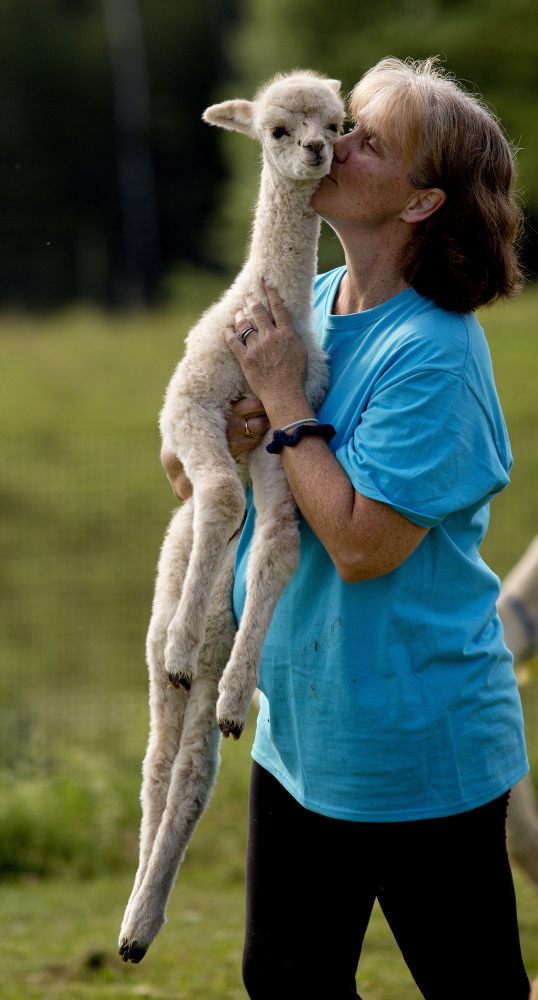Stacey Whitton is a former cardiac and recovery nurse turned alpaca farmer in Cumberland. She thinks if you are a Mainer with an alpaca, you really ought to have an alpaca blanket. And acquiring them involves a trip to the Maine Mall, but not the kind of trip you’d expect.
BY THE NUMBERS: Whitton and her husband, Tom Munroe, have been raising alpacas on Abbott Farm for about eight years. They have 33 of the animals, which they consider the friendliest of animals, practically pets. Oh wait, make that 34; one was born right after we talked. At Abbott Farm, the alpacas are raised for their fleeces, but elsewhere their waste is also a commodity – as composting material; for gardeners it is solid gold. The couple also have a store, Paca Naturals, in the Old Port, selling wools and knitted goods, including blankets made of alpaca fiber, and gift items.
SPEAKING OF BLANKIES: Claudia Raessler, one of Whitton’s alpaca-farming mentors, started the Maine Alpaca Blanket project a few years ago. Raessler gathered fleeces from farmers around the state and paid them in credit toward a woven blanket, a limited edition throw made entirely from local alpaca fiber. The idea was that a bunch of Mainers banded together could get a decent price at the mill. It was supposed to be a one-time thing. But “it was such a success we decided to do it again,” Whitton said. “Some farmers don’t know what to do with their fleeces. It’s kind of a specialty fiber.” Any extras will be available for sale, priced at around $140 for a 60-by-68-inch blanket, at the Paca store.
PACA. SAY WHAT? “That’s lazy slang,” Whitton says. Like, ‘Did you grain the pacas today?’ or ‘Have you seen the pacas?'”
WHAT’S SO GREAT ABOUT ALPACA? ” It’s five times warmer than wool!” Whitton says. Also, lightweight, like cashmere, but less expensive, and super warm. It doesn’t itch, she promises, because it lacks the lanolin of natural wood. Which means – another bonus – less processing.
BEST PACA-TRICES: This time around, Whitton got picky. Alpaca fleeces are rated on a scale of 1 to 6, with 1 being the finest – meaning that the individual fibers are less than 20 microns in diameter (14 is about as low as they go). The best stuff comes off the sides and back for the animal. “You get to grade 5, and you start feeling the difference with your fingertips.” At around 35 microns in diameter, the fiber is considered coarse or, more kindly put, “robust.” Whitton only accepted fiber in the grade 1 to 4 categories. “I wanted a very soft blanket.”
DO I NEED A MICROSCOPE? No, Whitton does the judging herself. She had drop-off days in mid-June (right after shearing season) at the Maine Mall, where she has connections (her husband’s day job is in construction, primarily at the Maine Mall). She gave the fiber the once over and awarded farmers credit toward the blankets. For grades 1 and 2, $7 per pound and for grades 3 and 4, $6. Eighteen farms participated. “I had some farmers bringing in 90 pounds at a time,” she said. But the alpaca business in Maine has fallen off, she said. “It’s not what it used to be. Just this year alone I have heard of three or four farms that have closed up business,” Whitton said. She ended up with just shy of 600 pounds. “I have been sorting and grading for four weeks now,” she said. “I have fiber coming out of my ears.” No word on how many farmers went home forlorn with their “robust” fiber.
THEN WHAT? It’s July. No one wants a blanket. Which is good because the blanket business is a laborious process. Whitton picks twigs and hay and poop out of the fleece at home in Cumberland, then sends it all to a washing facility in Waldoboro. From there it goes to a spinning mill in Pennsylvania (she couldn’t find a local spinner). Then it comes back to the Maine Woolen Mill in Brunswick to be woven into the blanket. Delivery date? “I hope before Christmastime,” Whitton said.
EMBARRASSING REVELATION: “I’m a full-time mom and an alpaca farmer, and I don’t even know how to knit!” she said. “Now, isn’t that something?”
Send questions/comments to the editors.




Success. Please wait for the page to reload. If the page does not reload within 5 seconds, please refresh the page.
Enter your email and password to access comments.
Hi, to comment on stories you must . This profile is in addition to your subscription and website login.
Already have a commenting profile? .
Invalid username/password.
Please check your email to confirm and complete your registration.
Only subscribers are eligible to post comments. Please subscribe or login first for digital access. Here’s why.
Use the form below to reset your password. When you've submitted your account email, we will send an email with a reset code.